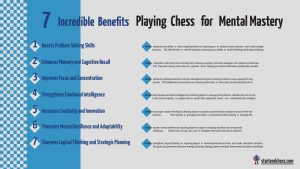7 Incredible Benefits of Playing Chess for Mental Mastery
Chess is more than just a game of strategy and tactics—it’s a powerful tool for sharpening your mind and achieving mental mastery. With its rich history and intellectual challenges, playing chess for mental mastery is one of the most effective ways to boost cognitive abilities, improve focus, and enhance problem-solving skills. Whether you’re a beginner or an experienced player, the benefits of playing chess for mental mastery extend far beyond the board. This timeless game helps individuals develop critical thinking, emotional intelligence, and creativity, making it an ideal practice for those seeking personal growth and cognitive enhancement.
In this article, we’ll explore seven incredible benefits of playing chess for mental mastery. By incorporating chess into your daily routine, you’ll not only become a more strategic thinker but also enhance your ability to handle challenges in both your personal and professional life. From improving memory and focus to fostering emotional resilience, chess offers numerous advantages for anyone looking to unlock their full mental potential.

-
Boosts Problem-Solving Skills
Chess sharpens your problem-solving skills by challenging you to think critically and make the best possible move at every turn. Each game presents unlimited variables; players need to consider the board from every possible perspective. This juggling of ideas in your head helps you develop the way to approach complex situations methodically and logically and, ultimately, how to implement this skill in real life. You learn how to remain cool under pressure, evaluate given resources, and come up with resourceful answers to challenges.
- Encourages the evaluation of multiple perspectives.
- Enhances decision-making skills under pressure.
Chess forces you to think a few steps ahead of what will happen if your opponent makes this move and how you will counter or defend against it. The prudence formulated from the ability to think ahead means you can make long-term plans about life. Whether it is at work or in organizing personal errands, this habit of thinking will get you organized and prepared for the future.
- Improves foresight and long-term planning.
- Develops patience in working towards outcomes.
-
Enhances Memory and Cognitive Recall
With time, all chess players develop very good memory. You will have to memorize various opening concepts, common endgames, and tactical patterns. This steady practice of memorization enhances your short-term and long-term memory. Advanced players often remember entire sequences of games and combinations of moves that enable them to decide faster and analyze their opponent’s strategy more effectively.
- Enhances memory by practicing the recall of patterns.
- Strengthens long-term memory through continuous learning.
Additionally, chess enhances cognitive recall, which refers to the ability of the brain to retrieve from storage the needed information in the quickest possible time. In this case, chess players learn how to retrieve, at particular times during the game, specific strategies and tactics. The ultimate benefit of this would come if applied appropriately in academics and at workplaces where efficiency concerning remembering details can come in handy.
- Sharpens cognitive recall through constant mental exercise.
- Improves the brain’s retrieval processes.
-
Improves Focus and Concentration
Chess is a game that requires a very high degree of concentration for long intervals. A moment’s distraction could result in one making a mistake and hence losing the game. Players are always on their toes in a game of chess. This kind of sustained focus you give to the task helps hardwire your brain into concentrating on tasks for much longer periods, a skill quite useful both at academics and professional situations. Chess trains your mind to be attentive and sharp under pressure.
- Strengthens sustained concentration and attention span.
- Reduces distractions by building mental discipline.
The mental discipline that one gets from chess is helpful not only at the game but also in daily living. Be it working on a project, studying, or even having conversations, with focused attention, all these get immensely improved if you are regularly practicing chess. With time, you develop a higher level of capability in tuning out distractions and really engaging with the given task.
- Increases ability to block out distractions.
- Enhances productivity and task engagement.
-
Strengthens Emotional Intelligence
Playing chess is all about the emotional ride itself. Chess players get to experience the taste of victory and defeat, too, learning to balance their emotions in the process. Gained emotional intelligence due to wins and losses taken graciously is worth its weight in gold. The players develop resilience by accepting losses and converting them into learning and improvement opportunities rather than letting those losses affect the mindset.
- Teaches emotional resilience by handling both success and failure.
- Develops emotional control under pressure.
Chess also enhances empathy by forcing a player to understand opponents. The game requires you to anticipate your opponent’s next move, which means putting yourself in their shoes. Being capable of predicting and reading other people’s strategies could enhance interactions with people around you and interpersonal relationships, hence being more empathetic emotionally.
- Enhances empathy by understanding opponents’ strategies.
- Builds emotional awareness in social situations.
-
Increases Creativity and Innovation
Chess is a game that requires both logic and creativity at the same time. Though there are structured rules and known strategies, every game happens differently; thus, room for creativity also exists. Players, more often than not, find ingenious solutions to intricate positions on the board, thus fostering a creative mindset. It could be devising an unexpected counter-move or a novel strategy; chess provokes players to think out of the box.
- Fosters creativity through unique solutions.
- Encourages innovative thinking by exploring new strategies.
As most players progress in their ability to play chess, they like to try unusual openings or other moves in an effort to become more creative. As a matter of fact, this playing actually makes them more creative in life because they can approach different situations in a unique way. Chess can teach you that at times success can be found by breaking away from the established norms.
- Promotes experimentation with new strategies.
- Stimulates creative thinking beyond the game.
-
Promotes Mental Resilience and Adaptability
Chess teaches you to be flexible and resilient. In the game of chess, hardly will the game go exactly as you had projected it. You will change tack according to how events unfold. This instills in you the ability to respond due to some unexpected situations that shape your resilience mentally. The challenges you go through on the chessboard-like losing pieces or falling into an inferior tactical trap-are part of life; hence, one has to be calm and devise another strategy.
- Encourages adaptability in changing situations.
- Teaches resilience through overcoming setbacks.
Moreover, chess engenders calmness under pressure. The mental battle in chess forces players to act with problem-solving even during the most critical situations, teaching them very important lessons of persistence. It also helps with mental toughness at both personal and professional levels, thus improving your ability to take care of any obstacle with poise and determination.
- Builds persistence through overcoming obstacles.
- Strengthens ability to stay calm and find solutions under pressure.
-
Sharpens Logical Thinking and Strategic Planning
At a core level, chess is logically played. To win, players have to think ahead with a strategy that includes balancing the risks and rewards of each move. This logical reasoning develops an analytical mind, which assists in making decisions that strengthen one’s long-term planning capabilities. Chess players study how to simplify big problems into smaller feasible steps, and through this process, they are indeed much better at planning and executing a plan in all spheres of life.
- Improves logical reasoning by analyzing potential outcomes.
- Sharpens decision-making based on calculated risks.
Besides, chess develops one’s strategic thinking. A player is supposed to think about his or her end goal and that of an opponent, thus planning two or three moves in advance. This forward-thinking skill becomes an asset in business, academics, and personal life, where it pays to anticipate challenges and prepare accordingly.
- Encourages forward-thinking and anticipation.
- Refines long-term planning and goal setting.

Discover more insights like this on [startend chess], where we explore the powerful benefits of chess for mind and body.
Conclusion
The benefits of playing chess for mental mastery are truly remarkable, offering a transformative experience for anyone seeking to sharpen their mind and improve cognitive skills. Whether you’re looking to boost problem-solving abilities, enhance memory, or cultivate emotional resilience, chess provides the perfect platform to develop these crucial mental faculties. Every move on the chessboard serves as a mental exercise, helping you grow as a thinker and strategist, while also offering practical life skills that translate into personal and professional success.
By embracing the benefits of playing chess for mental mastery, you’ll not only elevate your game but also your mind. This age-old game challenges you to think critically, stay focused, and adapt to changing circumstances, making it an invaluable tool for lifelong learning and mental growth. So, why wait? Start incorporating chess into your routine and witness the incredible mental transformation that follows.
If you’re interested in diving deeper into this topic, we’ve prepared a podcast just for you. Feel free to listen and explore more insights:
References:
- Gobet, F., & Campitelli, G. (2006). “Accounting for chess expertise: A pure strategy approach.” Cognitive Science, 30(1), 61-95.
- Miller, E. (2014). “The Effects of Chess Instruction on the Academic Performance of Students.” International Journal of Instruction, 7(1), 117-136.
- Kozhevnikov, M., & Chabris, C. F. (2018). “Thinking about chess: The role of working memory in chess expertise.” Cognitive Science, 42(1), 236-248.
- Fernández-Duque, D., & O’Reilly, R. C. (2006). “The relationship between chess and cognitive skills: A comparison of chess players and non-players.” Psychology of Sport and Exercise, 7(2), 143-155.
- Burgoyne, A. P., et al. (2019). “Chess and cognitive skills: Evidence from a randomized controlled trial.” Educational Psychology, 39(1), 82-95.
Recommended Articles:
- 7 Powerful Ways Chess Enhances Memory
- Mathematical Problem-Solving Abilities and Chess: An Experimental Study on Young Pupils
- 8 Proven Benefits of Chess for Better Decision-Making
- 10 Proven Health Benefits of Playing Chess Daily
- 7 Powerful Benefits of Playing Chess Before Bed: Boost Your Sleep and Brainpower



0 Comments